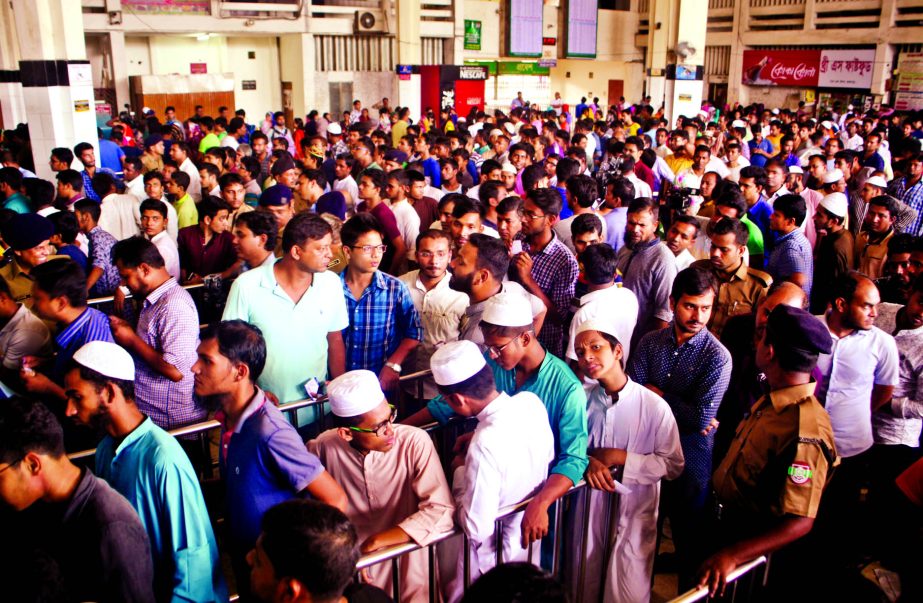
Badrul Ahsan :
The government is likely to complete formulation of a policy guideline for ride- sharing operators and vehicles soon aiming to boost revenue collection and bring them under its monitoring.
Uber, the global ride-sharing service provider, which operates its activities in 66 countries around the world, launched operation in Dhaka in November last year. It is reportedly gaining popularity fast in the capital.
In the face of the rapid growth of its popularity, the government is compelled to establish the regulatory framework.
Secretary of Road Transport and Highways MAN Siddique told The New Nation that a draft on ‘ride-sharing service guideline’ would be finalished this month and then it would be sent over to the Cabinet Division for approval.
The Bangladesh Road Transport Authority (BRTA) has already completed a public consultation on the draft, which states that ride-sharing companies and vehicles will be enlisted by BRTA and charged Tk 1 lakh for a year.
The draft also says the ride-sharing companies should have a provision for being able to connect to law enforcement agencies through the app to improve safety issues for the passengers.
“We want a good mode of public transportation for the people, and not just another revenue stream. If everything goes accordingly, I am hopeful to complete formulation of the policy within a couple of months,” MAN Siddique said.
However, details as how the government will earn revenue, whether the BRTA will fix fares, and a maximum number of cars which can be operated under a single company are all absent in the draft.
Golam Mortuja Hakim, a private service holder who uses Uber regularly, said: “I am still happy about the Uber fares, even after the company raised it.”
The draft guideline also suggests including taxis and auto-rickshaws alongside private vehicles, in response to concerns from existing transport owners that their businesses will be hit.
Dhaka Metropolitan CNG Owners Association President Barkatullah Bulu told The New Nation that the CNG operators had already been hurt by Uber’s arrival in the capital.
“We have petitioned the BRTA so that they are not allowed to run their business until the authorities pass a policy to regulate them,” he said.
The government is likely to complete formulation of a policy guideline for ride- sharing operators and vehicles soon aiming to boost revenue collection and bring them under its monitoring.
Uber, the global ride-sharing service provider, which operates its activities in 66 countries around the world, launched operation in Dhaka in November last year. It is reportedly gaining popularity fast in the capital.
In the face of the rapid growth of its popularity, the government is compelled to establish the regulatory framework.
Secretary of Road Transport and Highways MAN Siddique told The New Nation that a draft on ‘ride-sharing service guideline’ would be finalished this month and then it would be sent over to the Cabinet Division for approval.
The Bangladesh Road Transport Authority (BRTA) has already completed a public consultation on the draft, which states that ride-sharing companies and vehicles will be enlisted by BRTA and charged Tk 1 lakh for a year.
The draft also says the ride-sharing companies should have a provision for being able to connect to law enforcement agencies through the app to improve safety issues for the passengers.
“We want a good mode of public transportation for the people, and not just another revenue stream. If everything goes accordingly, I am hopeful to complete formulation of the policy within a couple of months,” MAN Siddique said.
However, details as how the government will earn revenue, whether the BRTA will fix fares, and a maximum number of cars which can be operated under a single company are all absent in the draft.
Golam Mortuja Hakim, a private service holder who uses Uber regularly, said: “I am still happy about the Uber fares, even after the company raised it.”
The draft guideline also suggests including taxis and auto-rickshaws alongside private vehicles, in response to concerns from existing transport owners that their businesses will be hit.
Dhaka Metropolitan CNG Owners Association President Barkatullah Bulu told The New Nation that the CNG operators had already been hurt by Uber’s arrival in the capital.
“We have petitioned the BRTA so that they are not allowed to run their business until the authorities pass a policy to regulate them,” he said.

